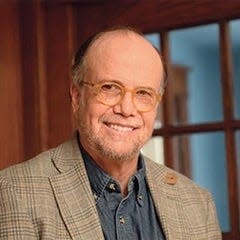Cannabis and psilocybin: Wild disparity in what doctor can say in Iowa and Colorado
As a physician in the field of psychiatry in both Iowa and Colorado, where the drug laws regarding cannabis (marijuana) and psychedelics such as psilocybin are entirely different, my legal and medical roles regarding what I can say about cannabis (for personal use) and psilocybin are a tale of two states apart.
Throughout the US, psilocybin is an increasingly popular psychedelic used for mental health disorders as well as by “healthy normals.” And with cannabis, Iowa is now all but surrounded: Minnesota, Illinois and Missouri all allow personal use (“recreational”) so Iowans now have easier access than ever, although still illegal save for a weakened strain of medical cannabis in Iowa dispensaries.
In Iowa, I can’t give advice about personal use of cannabis, whereas in Colorado my patients and contacts teach me. I can talk with patients in Colorado about possible psilocybin use for such symptoms as attention deficit, depression, PTSD, and obsessive compulsive disorder, where the possession, growing, and sharing is legal but one cannot legally buy psilocybin nor sell it … and I know, go figure. In Iowa I can refer interested folks to states where its use is decriminalized or even legal as in Colorado and in some where treatment centers are in process or currently set up.
In Colorado, Dr. Tom Garcia is a retired health care professional who refers to himself as a “psychedelic guide and integration coach” who can legally guide his clients who come from around the country and even world to spend up to a week with him and undergo two psilocybin “journeys” during this time. He will ask “Why are you here - what’s your purpose - what do you want - who are you?” His clients will stay in an apartment in his basement and go on walks and ceremonies at a fireside. He says his clients in some cases are looking for a spiritual experience, reaching for something, a deeper connection … that there is more to their life than this and they want to know what it is. In his newsletter Garcia wrote: “There is no question that psychedelics are making a comeback into the mainstream and offering new possibilities for health and well-being. But the potential benefits of psychedelics aren’t limited to mental health conditions. There is another side to this movement that has mostly remained underground. Many people who haven’t been diagnosed with a mental illness, as well as those who have, are finding psychedelics to be a doorway to a spiritual awakening. Myself included.” Several of his clients have been ministers with a Christian background and are “open to an expanded awareness of God or spirit or whatever they call it.” He referred to a study of religious professionals at Johns Hopkins University to explore if the experience of psilocybin enhanced their experience of spirituality.
The Center for Medicinal Mindfulness, based in Boulder, Colorado, is one of the first legal psychedelic therapy clinics in North America. In January folks in Portland, Oregon, will be able to experience professionally facilitated psilocybin in a new clinic opening. Research and trainings have been set up both at the University of California at Berkeley through the Berkeley Center for the Science of Psychedelics and through the Center for Psychedelic & Consciousness Research at Johns Hopkins University. Michael Pollen has excited the interest of many with his book “How to Change Your Mind: What the New Science of Psychedelics Teaches Us About Consciousness, Dying, Addiction, Depression and Transcendence” as well as his four-part series on the same on Netflix. The film “Fantastic Fungi,” also on Netflix, is another good source to be introduced to the world of mushrooms and plant-based medicines, including the experience of psilocybin itself. The amateur mycologist Louie Schwarzberg summarized his film with “I would say the conclusion of this movie is that we are interconnected beings with one another. That’s the world we live in.”

In Iowa, psilocybin possession is illegal. Still there are numerous Iowans who are using psilocybin not for mental health disorders but to grow as individuals. Some meet together to share their experiences and take turns being present for each other during psilocybin journeys. Some have reported increased compassion, less fear of death, feeling calmer, feeling connected to a bigger world, personality growth, more regulation of emotions, and improved focus in their work or daily lives, either through small amounts on a regular basis known as “micro-dosing” or larger doses that lead to experiences that can last some four to six hours.
I do not recommend anyone use illegal drugs in Iowa. I do recommend that we work together to make cannabis legal for personal use and that psilocybin and some related plant medicines be at least decriminalized on the road to legalization and the opening of treatment centers that can offer options for “healthy normals” who want to expand their own experience of life and for those with mental health conditions who have had limited success with traditional psychiatric treatments.

Dr. David E. Drake is an Iowa psychiatrist in private practice. Contact: drakeoffice@gmail.com.
This article originally appeared on Des Moines Register: Cannabis? Psilocybin? Doctor's roles vary wildly in Iowa, Colorado.
